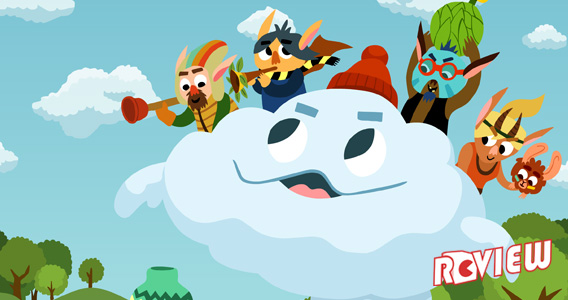
Poor Mother Earth! We humans have been treating her badly for far too long. But at least one good thing has come out of our mistreatment of the planet: it inspired the creation of the lovely Okabu.
With a strong ecological message, the game puts players in charge of halting the industrialized takeover of a blissful wilderness by a thoughtless empire, the Doza. But who possesses the power necessary to stand up to the might of such a mechanized menace? Cloud whales, of course!
Okabu does not take place in our world, even if its message reflects the perils we are currently facing. The game’s fantasy realm immediately brings to mind The Legend of Zelda: The Wind Waker, particularly Link’s home village. Okabu’s gorgeous, flat-shaded visuals leap off the screen with an abundance of color and detail. Zones within the game range from grassy lakesides to illuminated forests, and a good chunk of Okabu’s enjoyment comes from simply exploring every inch of these beautiful stages. The accompanying soundtrack, which mixes traditional African music with jazz, adds even more vibrancy to the already rich world.
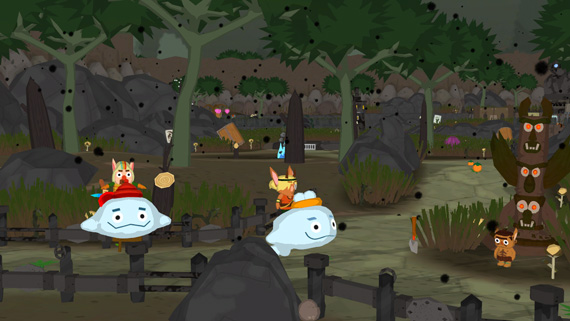
Navigating the game’s stages is a breeze thanks to the smooth, intuitive control of the cloud whales. True to their names, these creatures move about in a brisk manner as if they are swimming through the air. Beyond zooming to and fro, the cloud whales also have a few additional moves at their disposal, such as sucking up water (and other liquids) to sprinkle or shoot, picking up and spitting out special fruits that can be used for projectile attacks, and—most importantly—bringing aboard friendly natives as passengers.
These passengers each have their own special abilities, which you’re granted access to once the locals hop on the back of your whale. For example, one character comes armed with a grappling hook which can be used to drag items, shake trees, and pull levers. Other characters can charm animals and use them to remove obstacles or take remote control of Doza machinery and use it against its previous owner. Using these abilities in tandem is a must for solving puzzles, which makes Okabu at times feel somewhat similar to other cooperative games like The Adventures of Cookie and Cream.
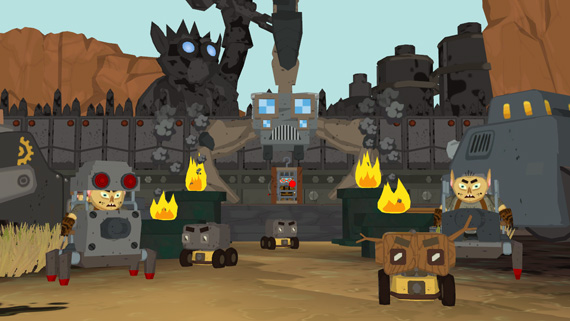
In Okabu’s single-player mode you have the option to toggle between the cloud whale brothers at any given time. There is also a two-player option, and I can imagine that if both players are skilled enough, it could actually make the game easier and allow for faster puzzle-solving. The quicker you complete a stage’s set of puzzles, the better chance you have of earning bonus points that will boost your score. Unfortunately, in my household the only other player available was my four-year-old son, and this became an exercise in utter frustration very quickly. Needless to say, I primarily played solo.
Okabu is peaceful, and it’s quite clear the game does not want you to fail. It challenges you, but never puts up an insurmountable wall, and always steers clear of becoming frustrating. Furthermore, you can’t die. In fact, other than enemy robots occasionally exploding, nothing in the game dies. Even when a cloud whale is hit by an enemy attack, nothing detrimental happens. The whale is momentarily stunned and drops a few pieces of any fruit it has collected, and its passenger is sent to the nearest respawn area. I found the lack of violence and the abundance of encouragement to be very refreshing.
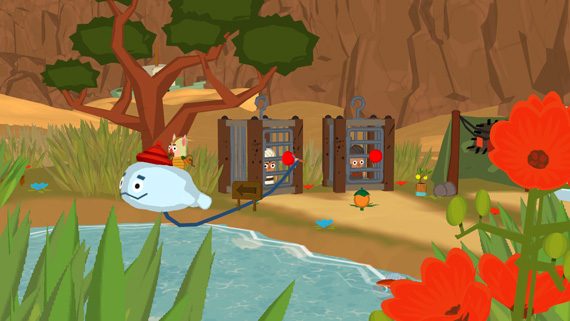
The puzzles progress in a linked “this-then-that” manner. Clearing one puzzle opens up access to another. Furthermore, they are full of a clever amount of variety. So, for instance, you might need to rid a lake of pollution by dragging broken machinery out of it, then suck up lake water and spray it onto a robot guarding a cage, then use a grappling hook to open the cage and let out a goat, and then lead the goat to a barricaded wall and have him smash through it. While your hand is held pretty tightly for the first few stages, before long you’re cut loose to figure things out on your own. I became stuck more often than I care to admit, but a solution was always nearby, and I eventually figured out what to do next, even though there might have been some cursing involved.
To assist players in their progression, there is an abundance of on-screen arrows hinting at where to go next. Generally these guides do a good job of being mere suggestions rather than explicit solutions to puzzles, but I can imagine there will be some players who quickly become annoyed by the continual nudges. Also, there was one stage in the desert world in which an arrow completely led me astray, pointing to a spot that had no relation to the puzzle I was working on. It took me about twenty minutes to figure out that the arrow was lying to me. But, overall, especially for a dummy like me who became quite befuddled on many an occasion, the guide arrows are a welcome inclusion.
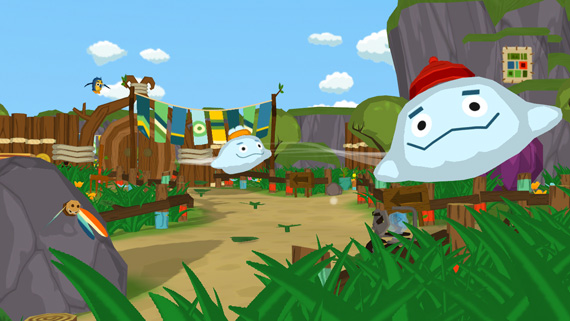
Okabu may be an oasis of cheerfulness in a market overrun by dark, gritty games, but it’s not quite paradise. As inventive as the puzzle designs are, the game’s stages are often too massive and contain more objectives than necessary. As much fun as I was having, I started feeling fatigued about two-thirds of the way through almost every stage. Trimming away some of the fat in exchange for more focused, leaner levels may have been to the game’s advantage. Perhaps the development team should have taken a page from Nintendo’s book and set Okabu’s stages up akin to the likes of Super Mario 64 or Super Mario Sunshine, where players reenter areas multiple times with different agendas. I found taking a break every couple of stages to play something else helped break things up and made Okabu far more enjoyable in the long run.
A few other negligible nitpicks should also be mentioned. For a game with such polish and care put into both its visual and sound design, the end of each stage is strangely anticlimactic. A blank white screen pops up for a few seconds before a simple score tally is displayed in complete silence. I found this odd.
Also, while the game is free of menu clutter, the user interface needs a little improvement. Most notably is if you pause the game, you are only given the option to restart the stage or return to the main menu, which can cause you to accidentally start over unless you press the Start button to return to the action. It doesn’t sound like an issue, but I accidentally restarted a few times, much to my dismay. Finally, I encountered a couple of instances where my cloud whale became stuck on an object in the environment and switching to the other whale was the only solution to fix the problem. Happily, none of these issues did much to hamper my overall experience.
Okabu’s theme of treating the planet with respect might be serious business, but it’s hard not to have your heart warmed and find yourself in an upbeat mood when you play it. It is as much of a fanciful escape from our world as it is a message to protect it. The game’s cheery design puts it in the same league as other super happy games like Katamari Damacy and Yoshi’s Island, even though it doesn’t possess nearly the same level of fine-tuned design. Okabu is at times too much of a good thing, so playing the game in moderation is to its benefit. But even if the vacation lasts a little too long at times, a trip to Okabu’s world is one that players will find well worth taking, and it might even remind them to give a hoot and not pollute.
Hand Circus
Publisher
Hand Circus
System
PlayStation 3 (PlayStation Network)
Modes
Singleplayer, Local Co-op
Release Date
October 18, 2011
Price
$14.99
*A copy of this title was provided by the publisher for review
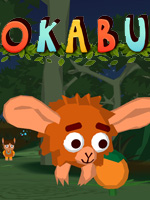
I’ll probably check it out once it goes on sale… I like the Devo Cloud Whale Brother.
Comment by Ujn Hunter — October 18, 2011 @ 3:24 pm